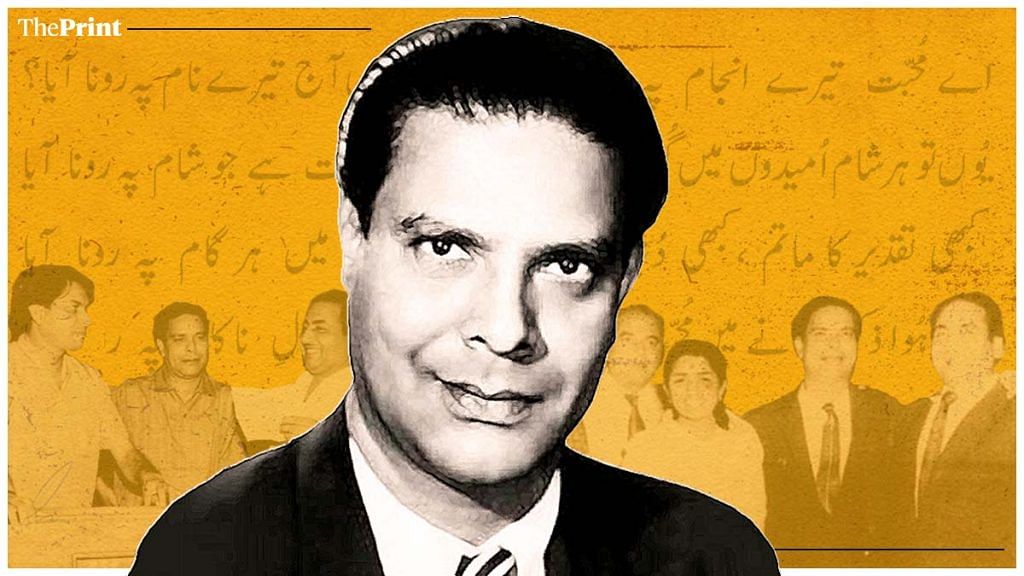Love them or hate them, you have to admit that Bollywood wouldn’t be Bollywood without its songs, especially romantic songs.
The idea of romantic love is an anchor of the Hindi film industry, and a lot of it comes from the music. That is the reason lyricists should be celebrated more — because they give words to music that then hold sway over generations of people, whether they watch the movies or not.
But while many lyricists can string together songs that become hit, only few are remembered for their poetry. One such poet was Shakeel Badayuni, considered the original romantic poet of Bollywood.
Born on 3 August 1916, in Uttar Pradesh’s Badayun, Shakeel was educated in Lucknow’s Aligarh University. Armed with an education in Urdu, Hindi and Persian, he showed a natural inclination towards poetry. He became a regular at mushairas and built a name for himself with his romantic ghazals.
After a short stint in Delhi, he moved to Mumbai in 1946 to pursue his dreams of being a professional poet. But where thousands with similar dreams failed, he succeeded — he hit the Bollywood gold pot almost immediately.
The story goes that he was spotted by none other than music composer Naushad, who asked him to sum up his talents in one line. Pat came the reply: “Hum dard ka afsana duniya ko suna denge, Har dil mein mohabbat ki ek aag laga denge.”
This led to Shakeel’s debut, with the famous song, Afsana Likh Rahi Hoon Dil-e-Beqarar Ka, for Dard (1947). Performed by Tun Tun (Uma Devi), the song was an instant hit and it sealed Shakeel’s partnership with Naushad. And the rest, as they say, was history.
The duo had some of the biggest hits of the 1950s and ’60s, including Deedar (1951), Mother India (1957), Baiju Bawra (1952), Mughal-e-Azam (1960) and Ganga Jamuna (1961). While Shakeel worked with Naushad for most of his career, he also did some memorable work with other composers, notably Ravi and Hemant Kumar.
Shakeel stood out from the pack due to the themes he chose. While many of his contemporaries chose to write about politics and the evils plaguing society at the point, Shakeel stuck steadfastly to writing ghazals about romance, love and heartbreak. He once wrote:
Main Shakeel dil ka hoon tarjuman
Keh mohabbaton ka hoon raazdaan
Mujhe fakhr hai meri shayari
Meri zindagi se juda nahin
He died rather suddenly, due to diabetes-related health issues, on 20 April 1970 at the age of 53.
Here are some of his best works to remember the romantic poet for.
Also read: Chaudhvin Ka Chand, Guru Dutt’s Muslim social that pioneered the bro code in Hindi films
Pyar Kiya To Darna Kya (Mughal-e-Azam, 1960)
Considered an anthem for lovers, this song perfectly captured Anarkali and Salim’s rebellion against Akbar, and the the fearlessness of those in the throes of passion, the confidence that love conquers all in the end. And even when the whole world is against you, you can’t back down because you have love on your side, Shakeel seems to tell lovers.
Afsana Likh Rahi Hoon (Dard, 1947)
In this song about waiting and wanting, Shakeel’s words express the feelings of a woman who’s waiting for her lover, eyes brimming with hope, valiantly fighting off hopelessness. Shakeel, in the short but profound song, captures the pain of waiting, of unrequited love, beautifully.
Chaudhvin Ka Chand Ho (Chaudhvin Ka Chand, 1960)
Guru Dutt and Waheeda Rehman’s hit Muslim social drama is known as much for its performances as for its music. The title song is a masterclass in sensuality, from the way the moonlight falling on Rehman’s sleeping form is captured on camera to the lovestruck, desire-filled words.
O Duniya Ke Rakhwale (Baiju Bawra, 1952)
One of Shakeel’s rare non-romantic songs, this one encapsulated the unfairness of the world. As the lead, Bharat Bhushan, rants to God about the injustices of life and the cards he has been dealt, his anger is visceral and palpable.
Na Jaao Saiyaan (Sahib Bibi Aur Ghulam, 1962)
A story about adultery and agency was the perfect setting for Shakeel’s poetry — and he delivered. This song, sung by Geeta Dutt, saw a woman boldly asking for sexual fulfilment from her husband, a rarity in Bollywood in those days.
Also read: Mohd Rafi was the voice that would soothe our broken hearts
